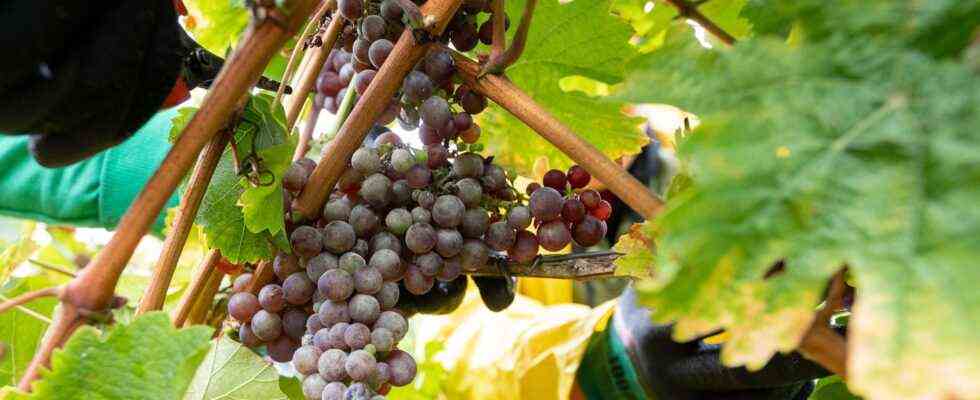Status: 11/12/2021 8:19 a.m.
Heavy rain, erosion, drought: the consequences of climate change are causing more and more problems for wine-growing communities. Eltville in Hessen reacts with various measures and also breaks with traditions.
Patrick Kunkel knows only too well what the consequences of heavy rain fall over the Rheingau. The mayor of Eltville lives at the foot of a slope and after such weather conditions felt half the vineyard in the garden. Soil erosion is a huge problem – not just for Kunkel and his garden. Especially in the vineyards on the slope, there is no soil washed away after heavy rain. Therefore, Kunkel’s mission is: We save the Riesling. “With such a casual slogan you shake up more people than if you tell them something about the ‘catalog of climate protection adaptation measures'”, says the mayor.
Sometimes too much, sometimes too little rain
The Rheingau is considered to be one of the best Riesling wine-growing regions in Germany. Of all the communities there, Eltville has the most slopes and steep slopes. The Steinberg in the Martinsthal district is so steep that many winemakers have long since given up.
Protecting the valuable vineyard soils and preserving viticulture is the goal of his sustainability strategy, says the mayor. Because there are two problems that at first glance seem absolutely contradicting: too much and too little water. “It rains too little for months,” says Kunkel, “then the floors dry out. And then suddenly there is heavy rain and wash everything away.” The aim of all measures must therefore be to keep as much water as possible in the vineyard. This helps the vines and the people who live below the vineyards. The flood disaster in the Ahr valley clearly showed that this can be vital.
Computer simulation reveals weak points
In Eltville, too, people have drowned after a harmless stream suddenly swelled up. That was decades ago, but it shouldn’t be repeated under any circumstances. That is why the city has had a computer simulation investigated where and when it becomes dangerous. The problem is not the Rhine – there, in the event of a flood, one can foresee relatively early on when the peak wave will come. It is the small brooks from which danger threatens.
He was very impressed by the heavy rain simulation, says the mayor: Within a few seconds everything on the monitor turns blue, first light blue, then dark blue where the water flows. “You can see exactly with what amount of rain which parts of the city virtually disappear.”
Heavy rain forces new planting
Climate change means that precipitation is more massive, faster and harder. The water washes away tons of valuable vineyard soil on the slopes and steep slopes, which later has to be laboriously brought up again. This is favored if the vines are planted along the slope as before. This is not only a tradition in the Rheingau, because it gives the plants the maximum amount of sun. But with climate change, sunlight is no longer the main problem. In the steep slopes like around Eltville, viticulture only has a future if the vines are planted in terraces across the slope.
With 90 hectares, the Hessian state winery Kloster Eberbach cultivate more steep slopes than any other winery in Germany, including in Rauenthal near Eltville. They are gradually switching to transverse terraces and are therefore a role model for other winemakers. Managing director Dieter Greiner says: “The transverse terrace breaks up the slope, so to speak. It is only a few meters from terrace to terrace, so the water flows more slowly. You keep it in the vineyard and reduce erosion.”
Further advantages of the transverse terraces: The work is less dangerous than on the steep slope; machines can be used there; and embankments create valuable habitat for native wild plants, insects and small animals. The Geisenheim University of Applied Sciences, which specializes in viticulture, has developed its own regional seeds for this purpose. Hikers enjoy the varied landscape in the vineyards.
Award-winning septic tanks
In the urban area of Eltville there are 24 kilometers of streams, 23 kilometers of ditch systems and 190 kilometers of dirt roads. Where does the rainwater flood? How can you derive it in a controlled manner? But where can it be collected to feed plants and animals in dry summers? Mayor Kunkel and his depot manager Stefan Seyffardt investigated these questions and learned a simple technique from foresters. They collect rainwater by simply digging holes in the ground in the forest.
Seyffardt is now digging such septic tanks along the vineyard paths: “We use the excavator to dig holes of three to five cubic meters at the edge of the path, where the rainwater flows in and can slowly seep away.” This raises the water table and relieves the streams. There are already 20 such septic tanks, it could be ten times as many.
For these and other climate adaptation measures in viticulture, Eltville received the German Sustainability Award last year. The city has been working with the Geisenheim University of Applied Sciences and the Wuppertal Institute since 2019. In addition, the city administration has created a network with the winegrowing association and local winegrowers. A lot of persuasion and some rethinking is necessary. But together they hope that Eltville can be spared the fate of the Ahr valley. And above all: that Riesling has a future.

